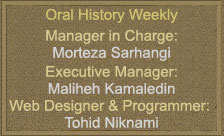| No. 415 | 22 October 2019 |
The 306th Night of Memory – 3Gravestone -by- Gravestone, in Search of the Tombs of Afghans martyrsThe 306th program of Night of Memory of the scared Defense was held in Soureh Hall of the Art Center on Wednesday 26th of September 2019, according to the website of Iranian Oral history. During the show, Ali Seyed Nasseri, soldier Ruhollah Razavi and Mohammad Soroor Rajaee spoke about the influence of Iranian Islamic revolution in Kashmir and Afghanistan.Letters completed by memoirsThe book “Sweet Love: Oral Memoirs of Qassem Zibaee Pour” has been published by Nekoo Afarin Publications in the northern city of Rasht in 2019. The 304-page book has been compiled in the Art Center of Gilan Province with an interview and writing done by Mir Emadeddin Fayazi. In his reference to the book, Fayazi has reminded, “Qassem Zibaee Pour was born in 1960 in the village of “Asiabsar” in the rural ...Opportunities and Challenges for Women’s Activity in the Field of Oral HistoryAccording to Iranian Oral History Website, interviewer women in the field of oral history of the Islamic Revolution and the Holy Defense has taken their place among Hozeh Honari, Islamic Revolution Documentation Center, Foundation for the Preservation of the Works and Publication of the Sacred Defense Values, Holy Defense Documents and Research Center, Ravayat-e-Fath Institute and Publication, and other practitioners in this area for years.The 306th Night of Memory-2Prayers That Were Granted in IranAccording to Iranian Oral History Website, the 306th session of memory night of Sacred Defense was held in Sooreh Hall of Hozeh Honari on Thursday evening, September 26, 2019. In the session, Ali Sayyed Naseri, Sarbaz-e (soldier) Ruhollah Razavi and Mohammad Sarvar Rajaei narrated the impact of Islamic Revolution in Kashmir and Afghanistan. Davood Salehi, the host of the 306th memory night of Holy Defense, before the second narrator, stated, ...Two Oral Histories; "Uprising of the Women of Mashhad on January 7, 1978" and "Shahid Mohammad Reza Shamsabadi"One of these books is Womans Liberation Day: The Oral History of Uprising of the Women of Mashhad on January 7, 1978, which has been written, and compiled by Somayyeh Zoghi, based on investigation made by her and Malihe Bakhshinejad and Neda Turkmancheh in the Oral History Department of Cultural Front of the Islamic Revolution Bureau, and has been published by Rahyar Publications. The book, also known as the first work in a collection entitled ... Oral History Weekly Magazine Aims and Regulations
Oral History Weekly Magazine wishes to create a suitable place for thoughts and idea development; Its main field would be “Oral History” and subjects as telling & writing memoirs, writing diaries, travelogues, chronologies, and all other subfields of history which are presented in the form of news, articles, reports, notes, interviews and memoirs can be included. There is no limitation on the length of would-be-sent materials. Mentioning the name, academic background and email is necessary. Articles with complete references and bibliography are more credited and an abstract would quite helpful. Weekly is not about to publish any material consisting insults and libels about other people or anything that brings anxiety to public opinion. Weekly can edit and translate the received materials. The published articles and materials are only the writer’s ideas and Oral History Weekly Magazine has no responsibility about their content. |
 Thirsty Sands (Part 14) Jafar Rabiei Design: Ali Vaziri First published in 1991 Publishing House, Islamic Propagation Organization Printed at the Aryan
Among the enemys new decisions on the goals they sought was the establishment of Hall 17. Those in this hall comprised very young Basijees, with the exception of eight persons, including me. The total number of persons inside the hall was about 60. Even though none of us had experience regarding the new collective life and the programs which we could occasionally carry out, the valuable pieces of advice given by our other dear friends in all area gradually removed our weakness in these regard, enabling us to coordinate our behavior with other brothers in the hall and implement special programs as did our other friends in other halls. The conditions of the halls markedly differed with those at the hospital in terms of different problems. It was perhaps due to these differences that the Iraqis constantly threatened to send the injured into the halls. So1nc of the differences were as follows:    |
